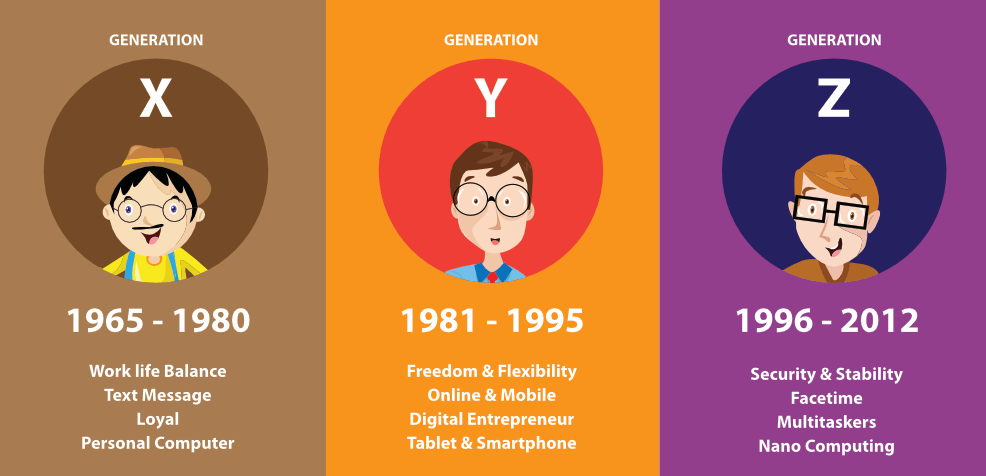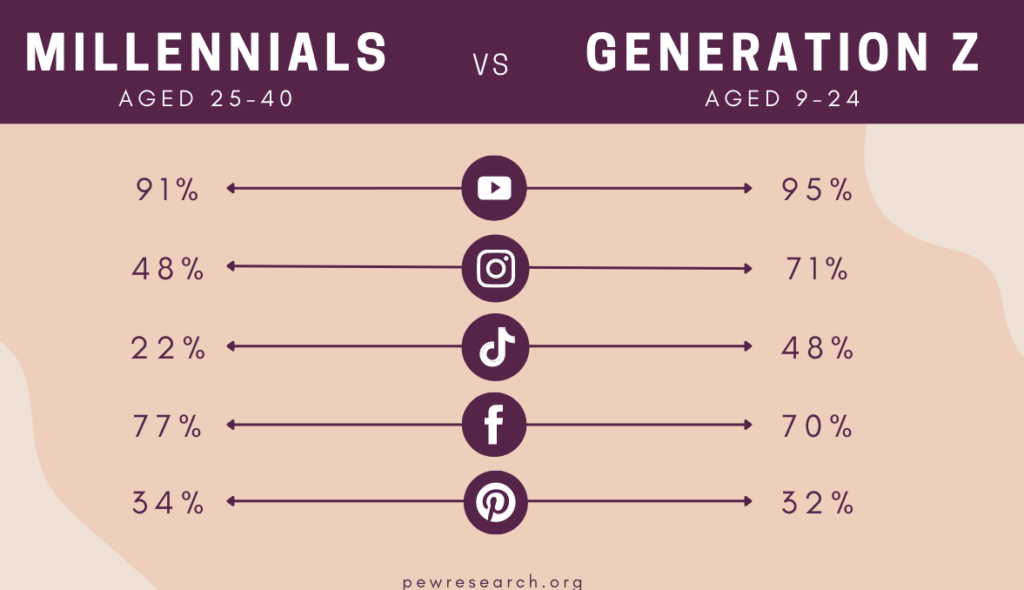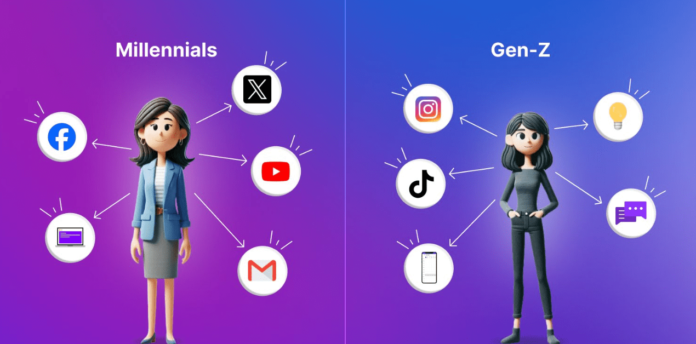Having grown up with the emergence of the internet and smartphones, millennials (born 1981–1996) are renowned for their flexibility in the digital era. Experiences and work-life balance are important to them. Having grown up with social media and constant connectivity, Gen Z (born 1997–2012) is more accustomed to using technology. With an emphasis on diversity, mental health, and social concerns, Gen Z is more likely to be practical and enterprising. Although both generations are tech-savvy, their approaches to communication, technology, and job objectives differ because of their disparate cultural and economic backgrounds.
Growing Up in Different Times
A Tale of Two Eras
The experiences of Gen Z and Millennials, who were influenced by various technical, cultural, and societal environments, are contrasted in A Tale of Two Eras. Gen Z grew up surrounded by digital connectedness, while millennials adjusted to the emergence of the internet and mobile technologies. Their attitudes, communication, and perspective on life are influenced by these unique formative experiences.
Economic Challenges: Different but Similar
Economic issues including growing student loan debt, exorbitant housing expenses, and unstable employment markets are common to both Gen Z and Millennials. However, because of the timing of technical advancements and economic recessions, their experiences are different. While Gen Z faces inflation and economic instability in the digital era, which affects their financial priorities and job perspective, Millennials suffered during the 2008 financial crisis.

Technology: Digital Natives vs. Digital Pioneers
Millennials: Pioneers of Social Media
Social media was invented by millennials, who saw its emergence and incorporated it into their daily lives. They adopted social media sites like Facebook, Instagram, and Twitter, influencing the development of online communication, social ties, and commerce. Influencer culture, digital marketing, and the social media environment that Gen Z would build upon were all made possible by this generation’s early adoption.
Gen Z: The True Digital Natives
Gen Z, in contrast to Millennials, has never known a world without social media and cellphones. They are adept at using applications like Instagram, Snapchat, and TikTok and choose brief, visually appealing material that is convenient to consume while on the go. Gen Z avoids the highly filtered aesthetics that are popular with Millennials and instead embraces authenticity online. For Gen Z, social media serves as a platform for activism, self-expression, and exploration in addition to being a means of communication.
Communication Styles: Text vs. Video
Millennials: The Texting Generation
The term “texting generation” is frequently used to describe millennials, who grew up while SMS and early mobile messaging were popular. Their main method of communication shifted to texting, which impacts their social and professional interactions. They were the first to accept texting as a commonplace tool, which paved the way for the broad use of digital communication, which has since been further enhanced by social media messaging platforms and applications like WhatsApp.
Gen Z: Video First
Gen Z’s preference for video-based entertainment is consistent with their status as digital natives. This generation grew up with live-streaming, TikTok challenges, and YouTube influencers. They frequently prefer FaceTime or video messaging to texting because they feel at ease in front of the camera. Many Gen Zers favor visual resources and video tutorials over written instructions, which is reflected in their preferred learning methods.
Work and Career Goals: Stability vs. Flexibility
Millennials: The Search for Stability
In their quest for security, millennials have had to contend with shifting employment markets, growing living expenses, and unstable economies. Many people started working during the 2008 crisis and are currently dealing with issues including job instability, housing affordability, and student loan debt. Despite these obstacles, they view work-life balance, financial stability, and job advancement as essential components of attaining stability in an unpredictable environment.
Gen Z: Flexibility and Passion
Gen Z has witnessed the explosive growth of remote employment, entrepreneurship, and the gig economy. They want employment that offers meaningful work, remote choices, and work-life integration, placing flexibility over stability. Because Gen Zers prioritize personal fulfillment over traditional career pathways, they may be more receptive to project-based work, side gigs, and freelancing. For them, a profession offers a chance to discover meaning and influence in addition to earning money.
Social and Political Views: Activism and Awareness

Millennials: Advocates for Change
Compared to Generation Z, millennials are renowned for their activism and support of social justice, LGBTQ+ rights, and climate change. They matured throughout the nascent phases of climate advocacy and protests such as Occupy Wall Street. In contrast to Generation Z, millennials believe that activism is a vital aspect of life, even though they are frequently prepared to cooperate with current structures in order to effect change.
Gen Z: Socially Conscious and Unafraid
Though they take a more extreme stance, Gen Z is just as enthusiastic about social problems. This generation was acutely aware of global challenges from a young age since they were raised with social movements and information readily available to them. Gen Z is outspoken, unrepentant, and not scared to question the current quo. For many members of Generation Z, activism is about establishing norms and building a more inclusive environment, not just about altering legislation.
Spending Habits: Experiences vs. Ethics
Millennials: Spending on Experiences
Millennials place a higher value on experiences than material possessions, which reflects a change in priorities toward making memories. Travel, eating, and unusual activities are valued by this age, which frequently choose experiences that promote social interaction and personal development. Many people find that these experiences provide a greater sense of contentment and joy than conventional purchases, which has an impact on sectors like food, entertainment, and tourism.
Gen Z: Conscious Consumers
Gen Z is very concerned about the morality of the companies they support. Before making a purchase, this generation is more inclined to look at a company’s social and environmental effect. They frequently choose businesses that share their ideals and place a high importance on inclusion and sustainability. Additionally, Gen Z is more inclined to spend money on long-lasting, high-quality goods rather than fads or rapid fashion.
Mental Health: Openness vs. Resilience
Millennials: Normalizing Mental Health Conversations
Talking about mental health has become more commonplace thanks in large part to millennials. In an effort to raise awareness and lessen stigma, this generation has been more forthcoming when talking about problems like stress, anxiety, and depression. They have prioritized mental health via activism, social media, and personal narratives, inspiring others to prioritize self-care and seek assistance in both personal and professional settings.
Gen Z: Mental Health as a Priority
By seeing mental health as a priority rather than as a part of life, Gen Z has advanced the discussion of mental health. This generation doesn’t hesitate to demand mental health days, set limits, or ask for help when they need it. For Gen Z, personal development and mental health are connected, and they are prepared to undertake big life adjustments to safeguard their mental health.
What Does the Future Hold?
Collaboration and Learning from Each Other
Gen Z and millennials may both learn a lot from one another, despite their differences. Gen Z brings new ideas, inventiveness, and a drive for change, while Millennials contribute flexibility, resilience, and a strong work ethic. These generations may collaborate in the workplace to foster cultures that respect consistency, adaptability, and creativity.
Shaping Tomorrow’s World Together
Working together across generations, sectors, and cultures is essential to addressing global issues and bringing about constructive change in the world of tomorrow. Innovation, sustainability, and inclusion may be used to create a future that embodies our common ideals. With their emphasis on social concerns and technology, millennials and Gen Z are playing a significant role in creating a more connected and just society for all.
Final Thoughts
Although Gen Z and Millennials may not always agree, their differences are a reflection of the distinct eras in which they were raised. We may promote more empathy, cooperation, and respect for one another by being aware of these generational characteristics. Every age, after all, has something important to contribute, whether it is creativity or experience. What can we learn from Gen Z and Millennials now to improve the world tomorrow?




